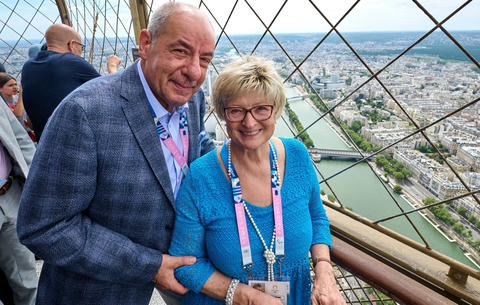Eva Beleznay
Eva Beleznay, 44, has finally been confirmed in her post as chief architect of Budapest. Beleznay's family has not followed a straight path to success. A noble ancestor once gambled away the vast Beleznay fortune, leaving her grandfather to eke out a living as a master carpenter while raising his son to become a university professor of physics.
Beleznay was a good student, excelling in mathematics at the elite Fazekas Gimnazium in Pest - though she had no fondness for the subject. A talented draftswoman, she "had creative thoughts, and even at secondary school [I] liked to wonder the city with my friends and explore the eclectic inner courtyards." She ended up at the Technical University in Budapest. Her career was very atypical in the Hungary of 1986. With an architect's diploma, she followed her husband on a scholarship to America, where she studied city management and planning at the University of Pennsylvania. Only eight years later did she return to Budapest, now a mother of two. She started work at the city planning institute, but did not feel at home. She tried working in property sales and online business, until she finally ended up in the city's architectural office, then led by Istvan Schneller. In 2005, Imre Ikvai-Szabo, the deputy mayor, appointed her acting head of the architectural office, and she applied for Schneller's job when he finally threw in the towel. She failed on the first try, and was appointed acting chief architect on her second attempt.
"I loved basketball, and whenever we could we tried to take part in the cross-Balaton swim. For years I biked to work, but with the uniform I have to wear for my job I can't do this any more," she says, summing up her active past. Then a surprise: "I played violin at school, but I never liked it, though I've just asked for a cello for Christmas." This sound will be inflicted on her husband, a mathematical modeller, and her two children, Kinga, 15, and Peter, 18, in their Sashegy flat.
What kind of house does a chief architect like to live in?
I've never considered building my own house. I've never felt a need for my own garden, for a big house, for my own little empire. Not to mention that my wallet could never have stretched that far. But look, I'd happily have bought a good terrace house, but that doesn't really exist in Budapest. There are some old ones in the city, but they don't get much sunshine. For us, adequate light is very important.
Cast some light on your appointment, if you will. What exactly is the difference between an acting chief architect and an appointed chief architect?
My responsibilities are the same. There's only a difference as long as the final decision has not been taken. When I was first appointed, I couldn't get started on long-term strategic issues. As acting chief architect, I had the same tasks as an appointed chief architect. That situation has now been addressed now that the mayor and the city's chief executive have cast a vote of confidence in me.
You can't complain. You've often been in the right place at the right time. Just after graduating you were able to travel to the USA, which wasn't an everyday occurrence back in 1986.
You have to choose the right partner. My husband scored one of the highest scores in his mathematics finals at ELTE University, and he was the first to apply for a scholarship to an American university. Along with a friend, he wrote to almost 70 universities and won places at two of them. He chose Rutgers in the end.
That was him. How did you get into higher education over there?
I immediately started learning English, and a year later I also applied to several universities. In the end, the University of Pennsylvania took me on because one of the professors had the idea of building a very diverse team around himself. He appointed Far Easterners, South Americans, Arabs - and me. There was only one problem: the tuition fee was higher than our annual income. But once again, I was lucky when an opening came up and I got a job as a professor's assistant.
How did you resist the temptation of staying there? Or did nobody want you?
We never wanted to stay there. If we hadn't taken that decision right at the beginning, we'd certainly have stayed, because life is easier in America. There weren't endless queues, there was a great library. Our son turned five at that point, and we wanted him to go to a Hungarian school.
You never felt a desire to return to a functioning America?
A panicky desire to head back once overcame me in my favourite library at the Technical University. The most recent scholarly articles were 10 years old and there were no open shelves. I started filling out the request slips, and eight out of the 10 books I requested had already been lent out. The remaining two were not the ones I'd asked for.
And this despair led you to the private sector. But you didn't stay. Why didn't it suit you?
I'd like to have surveyed trends on the property market, but nobody needed a researcher - I would have been a salesperson, which is not my world. How can I tell somebody they need this or that property when they don't agree?
So you fell back into architecture. How did that happen?
I called Istvan Schneller, the chief architect, who was also the head of department at the university, and I applied to do my PhD with him.
Great. But you don't have those magic letters "Dr" in front of your name...
Because Schneller wanted me as a consultant on urban regeneration, which gave me a comfortable living.
And since then your career has always been on the up. Admittedly, there have been plenty of squabbles. Now there's a huge political debate about whether the new government quarter is needed or not. In the past, you didn't seem to be a supporter of the idea. Are you recanting?
I did indeed consider it to be a pointless prestige investment in the past, something that wasn't needed. But when I looked more closely and saw that it would be possible to integrate the area into the city, then I became a supporter of the idea. I think it's one of the most important regeneration projects of the near future - because it creates parkland where you couldn't otherwise have it. It would also provide scope for more residential units and for cultural institutions.
We'll see where the political debate goes. Will you speak up?
I've already made clear to the deputy mayor that I have no wish to get involved in politics. I don't really think that any kind of architecture can be described as liberal or anything else. Take skyscrapers - for years, there have been people both pro and anti in both Fidesz and the Socialist Party.
Do you have any favourite buildings?
I like the ING headquarters on Dozsa Gyorgy ut, but I like the buildings of the 1920s as well. The nicest area is the one behind Napraforgo utca and Pasareti ter in the second district. They asked all the greatest architects of the period to design one family house each.
ANDRÁS LINDNER - ZOLTÁN HORVÁTH









